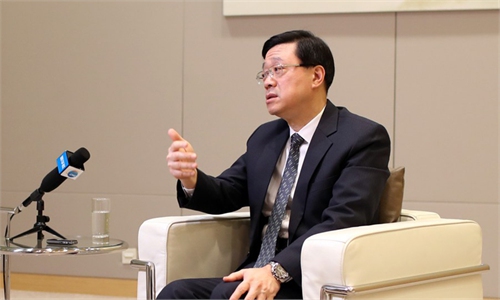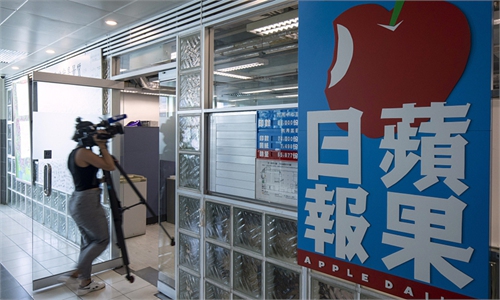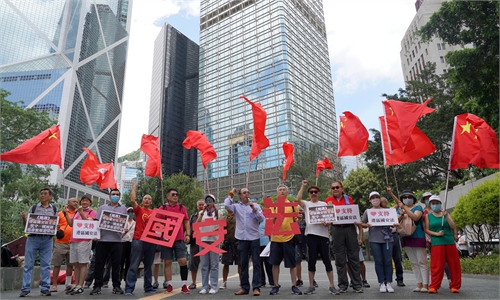People from various sectors in HK see changes for the better brought about by the National Security Law
Editor's Note:
With the National Security Law (NSL) for Hong Kong having been enacted in the Hong Kong Special Administration Region (HKSAR) for a year, many ordinary Hong Kong residents have considered the law to be a "silver bullet" or a guardian that enables them to return to their peaceful daily life and provides them with the freedom to freely share patriotic sentiments. On the first anniversary of the enactment of the NSL, Global Times reporters Hu Yuwei and Zhao Juecheng talked to representatives from various sectors in Hong Kong including education, finance, security, and press to review the changes in society and their respective working sectors. Many feel they are morally justified and motivated to celebrate the centennial of the Communist Party of China (CPC) and to show support for the national security law for Hong Kong.
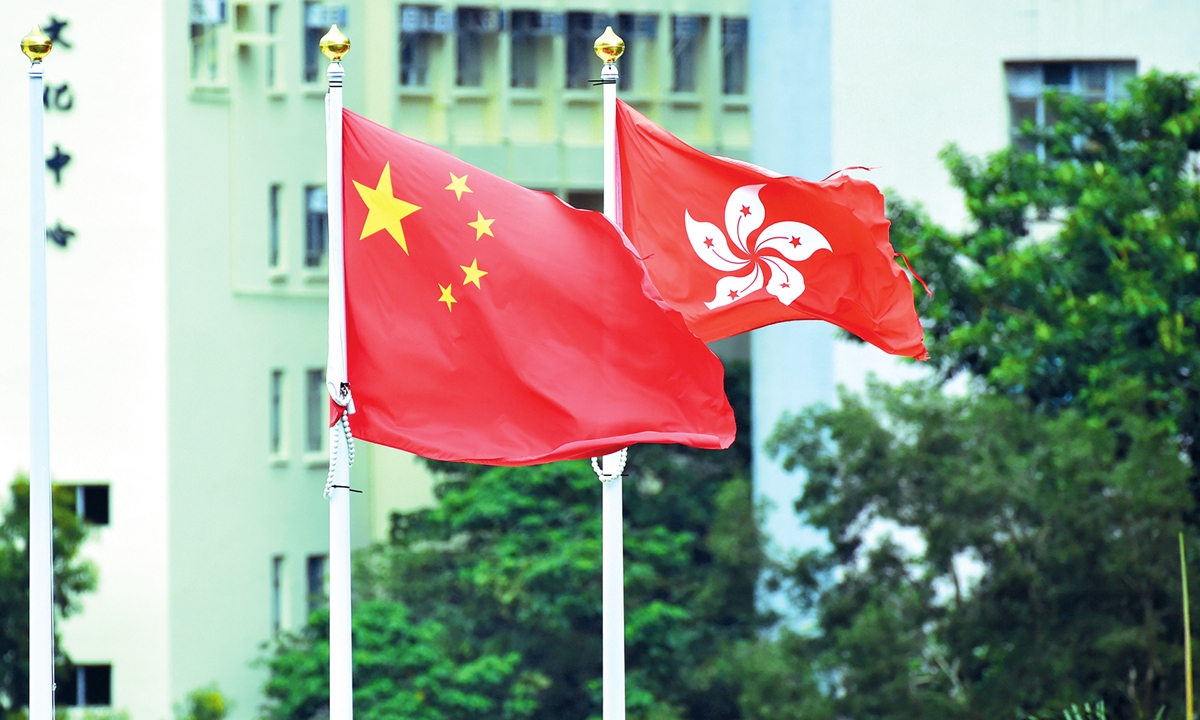
Tang Fei, principal of Hong Kong's Heung To Secondary School
The enactment of the NSL has brought about important changes in Hong Kong's education. Since the law was passed, I have not heard of any secondary schools that have continued to display political slogans and conduct the so-called demonstrations. The atmosphere on campus has apparently changed.
In accordance with the NSL, the education bureau issued in February a notice to schools to start promoting education on national security and to launch relevant teaching staff training. The first batch of educational materials on national security was also published.
Raising the national flag and singing the national anthem is also increasingly common in Hong Kong's schools. Even the practice of students making insulting gestures or adding insulting signs to the national flag while singing the national anthem has been completely banned since the implementation of the NSL.
Another remarkable change in the education sector is replacing the much-criticized Hong Kong Liberal Studies and relevant textbooks with "Citizenship and Social Development" studies which had attached a new focus on national security. Though the reform has been imperative, the NSL surely brought the transformation into an upright path in a faster manner.
Previously in Liberal Studies, some teachers with political bias would interpret the provisions selectively or interpret the Basic Law of the HKSAR in a prejudicial way to brainwash the students. Comparatively, the new course introduced the history in a more comprehensive and complete way, including the central government's discussions on Hong Kong after 1949, the Sino-British negotiations in the 1980s, and the process of drawing up the Basic Law in the 1990s.
Recently, the atmosphere around the campus to celebrate the centenary of the founding of the CPC has gotten stronger, and the society is celebrating the day in an open and high-profile way. When such a social ethos becomes mainstream, fundamental reforms on campuses will not be far away.
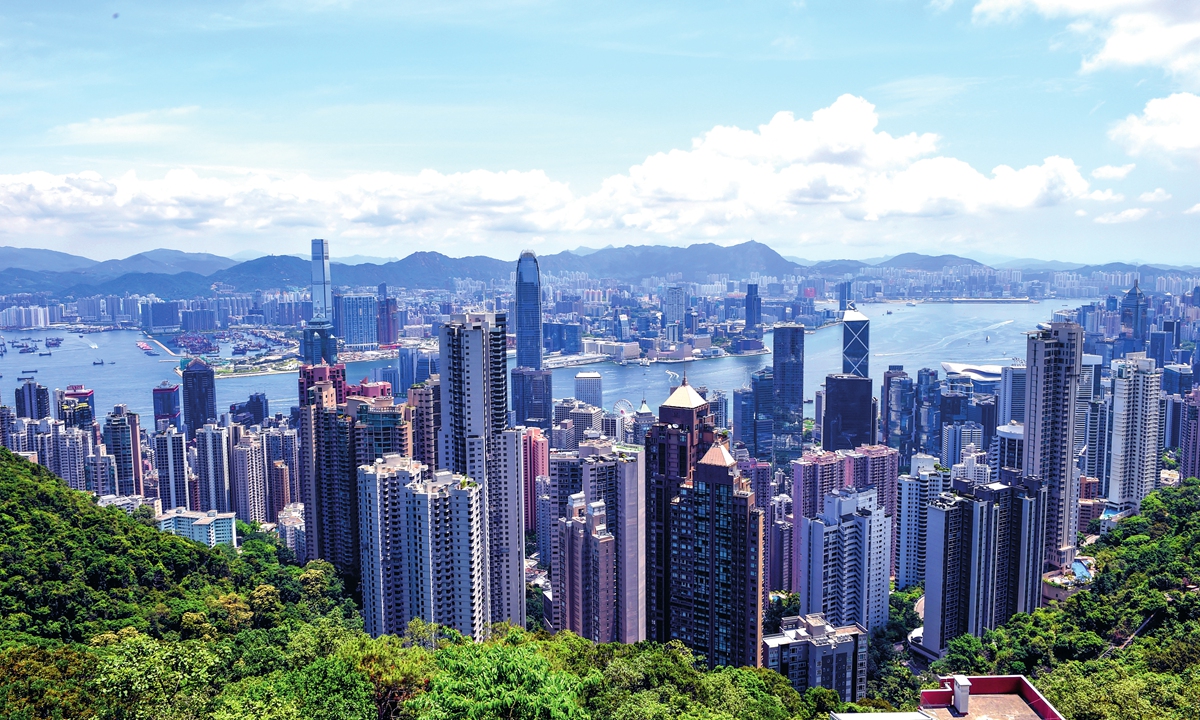
Huang Xiaosi, a mainland student at the Hong Kong University of Science and Technology
It is fortunate that the university campus has returned to a state of relative calm after the enactment of the NSL. Public unruly protests are no longer a common sight, and the infamously dubbed "Lennon Wall" had been cleaned up. The Students' Union, which was active in 2019, has ever since gone pretty silent. The campus has returned to a "politically chilled-out" atmosphere with only issues such as COVID-19 and vaccines being widely discussed.
With the NSL currently in place, we mainland students are no longer worried about our own safety or privacy. We can more freely speak Putonghua on the campus and feel safe to communicate with local peers who might hold divergent political views without the fear of "being doxed" by some radical protestors as was the case during the conflict-ridden period in 2019.
What happened in 2019 left a negative impression of local people on me. But as the dust settles on the social strife we had all experienced, I am pleased to learn that many Hong Kong people are quite nice and friendly, despite having different viewpoints and mind-sets due to a different social environment. In the long term, the NSL is far more likely to streamline relations between locals and mainlanders, and effectively help overcome prejudice between the two sides.
The law is solid support needed by many mainland students to feel safe and comfortable while pursuing their studies here in Hong Kong.
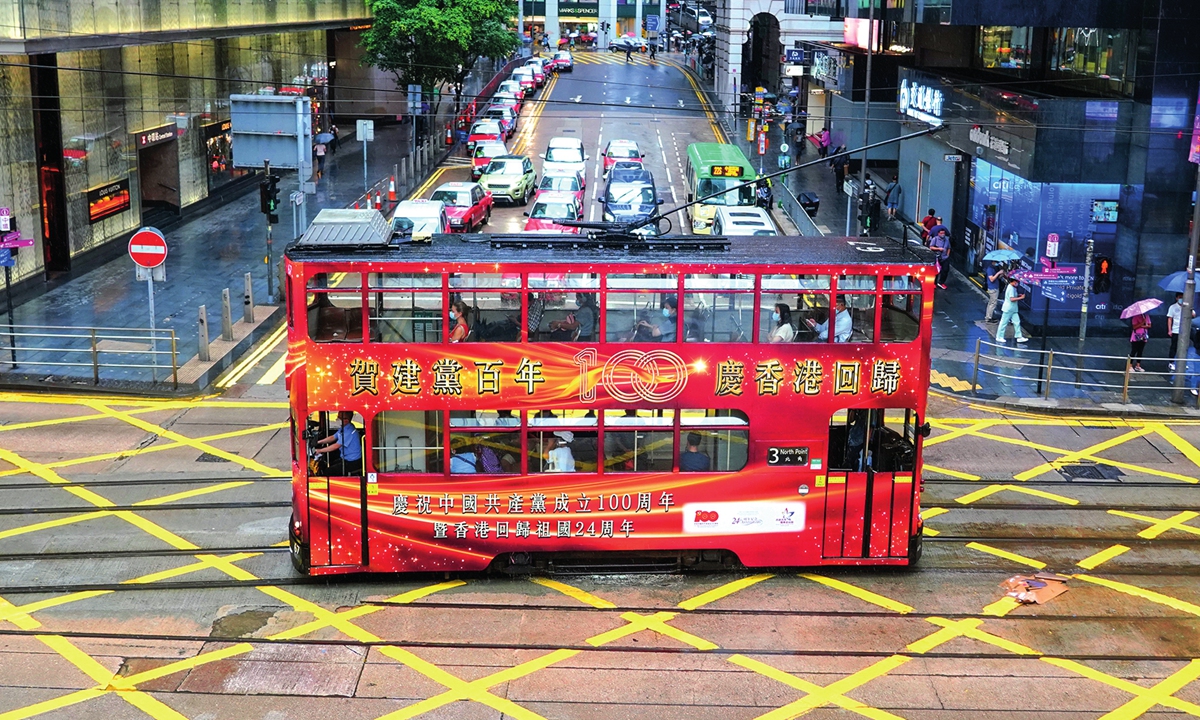
Anonymous, a local journalist working for a Hong Kong media
Days before the occasion to mark the first anniversary of the NSL, Apple Daily announced its closure. Undeniably, both the paper's appearance and departure have brought about a remarkable change to Hong Kong's media landscape.
When I was a student, Apple Daily was a negative example due to its "bottomless tabloid style" which makes news more entertaining through vulgarizing it. To a large extent, it is more than just a media house, but a concerted effort that solidified a certain mind-set within the Hong Kong society over the past 20 or 30 years.
Admittedly, the closure of Apple Daily has also raised concerns among some in Hong Kong's media industry. Just like when the NSL was first introduced, many Hong Kong media outlets would ask their legal advisers to explain what should be paid attention to, to avoid crossing the NSL red line.
Some reporters and editors gradually realized the importance of the NSL and began to accept its authority. More started to understand that the media should also be responsible for their published works and remarks but not in an "absolute" freedom of speech setting.
The content of media coverage is also evolving. For instance, patriotic voices are also increasing, rather than the once mainstreamed criticism against the Chinese central government and the CPC. It is clear that a new trend in public opinion has emerged.
In the past, few audiences were interested in Hong Kong media's coverage of "one country, two systems" and "national governance," but now there is an increasing number of reports about these issues, and more readers are willing to participate in the discussion.
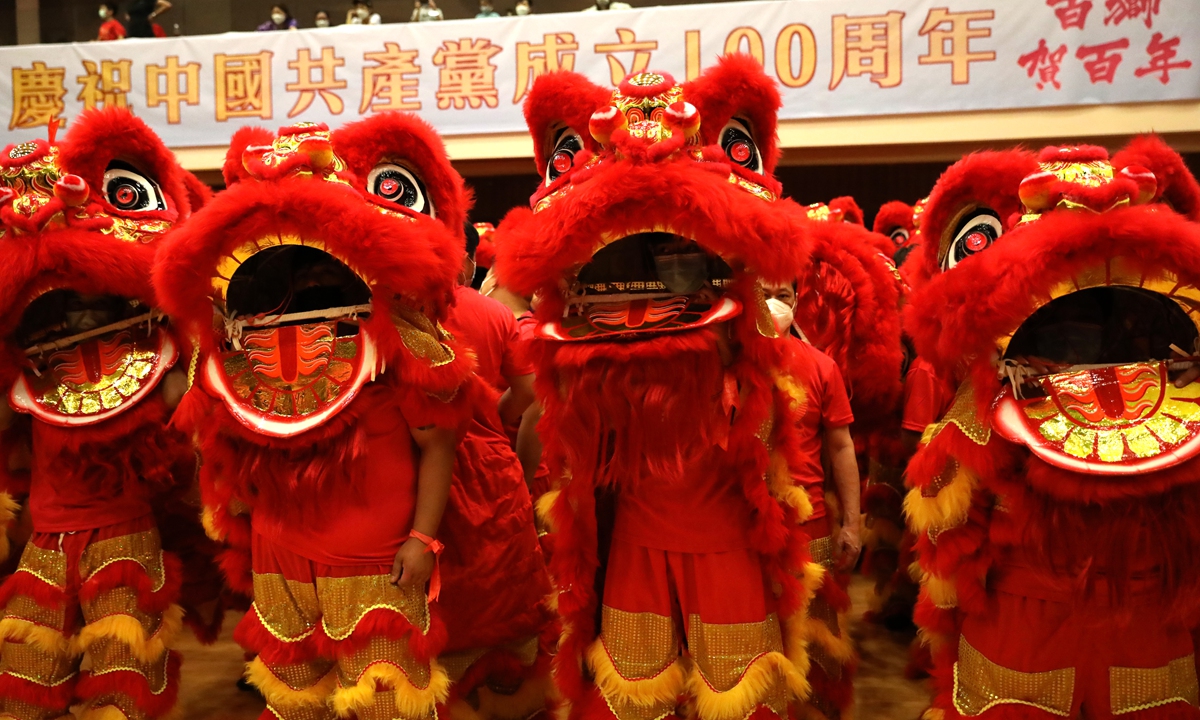
I've been working on the front lines as a police officer for over 20 years and I've seen a lot of changes in law enforcement since the NSL landed. In the past, some radical rioters took advantage of the loopholes in Hong Kong's laws to engage in illegal assemblies or secessionist activities in the name of religious or academic activities, which made our law enforcement difficult.
Some media outlets sprung out to criticize the police on a one-sided attack and many in the public who supported us feared to publically declare their support. It was a painful period for the whole police force in Hong Kong and for nearly two years we've been waiting for a law to protect us.
Now we have full confidence in the central government and the NSL, and we thank the central government for its timely rescue of Hong Kong.
The police force is the final line of defense of law and order in Hong Kong. That's why many radical rioters constantly attack us and blur the line between right and wrong in our enforcement to pressure us. We did not know how long we still had to suffer that sort of antagonism. Morale in the force had been low, and it was sometimes necessary for us police to take taxis home in groups from work, carrying batons for fear of being attacked by street mobs.
For more than half a year, I was afraid to visit my parents for fear that my job as a policeman would bring safety risks to them. Thanks to the support and arrangement of the Hong Kong Police Force and the mainland authorities, some police officers have sent their children to study in the mainland, which is a very important and considerate support to us.
Confidence and legitimacy have now been restored in the police force. We are no longer worried about the safety issues, and our daily duty focus has also shifted from fighting against mobs in 2019 to caring for daily security.
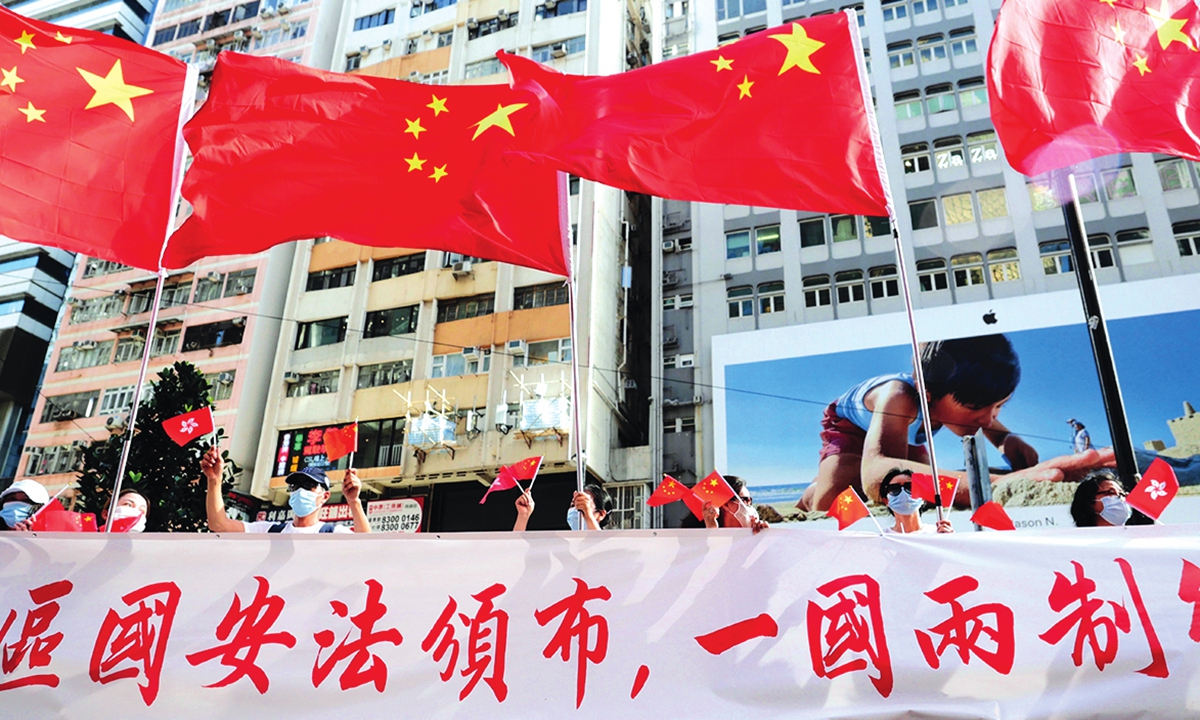
Zoe Ting, a Hong Kong-born employee working for a financial institution
The most obvious change brought about by the NSL is the return of order in both the society and the residential communities. After the enactment, we can finally enjoy calm and peaceful weekends instead of having to deal with the consequences of flagrant secessionists paralyzing essential services within the city, such as the public transport system. The days when the city was overrun by radical rioters were a nightmare for many office workers. Some mainland-fund companies in our office buildings have had to form a self-defense force, nailing thick layers of wooden planks to their exterior walls to prevent thugs from smashing them up.
Looking at the burned ATM machine downstairs, many employees who worked in mainland-funded enterprises were in a constant daily panic. They were afraid that one day they would also be the target of hatred by the mobs. We did not realize just how much we had missed peace and freedom until the city began to return to a state of relative normalcy after the enactment of the NSL. Mainland-funded companies are increasingly becoming a wise option for many young locals working in financial institutions because of their efficient management, advanced applied technology, and higher salaries despite the pandemic.
The NSL for Hong Kong drew a red line for the radical activists. The company I work for, for instance, has made clear rules that employees are not allowed to wear any slogans with sucessionist affiliations or could be interpreted as words of incitement. When recruiting, HR staff will also check whether the candidate had participated in illegal activities which obviously crossed the red line.
With the National Security Law (NSL) for Hong Kong having been enacted in the Hong Kong Special Administration Region (HKSAR) for a year, many ordinary Hong Kong residents have considered the law to be a "silver bullet" or a guardian that enables them to return to their peaceful daily life and provides them with the freedom to freely share patriotic sentiments. On the first anniversary of the enactment of the NSL, Global Times reporters Hu Yuwei and Zhao Juecheng talked to representatives from various sectors in Hong Kong including education, finance, security, and press to review the changes in society and their respective working sectors. Many feel they are morally justified and motivated to celebrate the centennial of the Communist Party of China (CPC) and to show support for the national security law for Hong Kong.

Photo: IC
Tang Fei, principal of Hong Kong's Heung To Secondary School
The enactment of the NSL has brought about important changes in Hong Kong's education. Since the law was passed, I have not heard of any secondary schools that have continued to display political slogans and conduct the so-called demonstrations. The atmosphere on campus has apparently changed.
In accordance with the NSL, the education bureau issued in February a notice to schools to start promoting education on national security and to launch relevant teaching staff training. The first batch of educational materials on national security was also published.
Raising the national flag and singing the national anthem is also increasingly common in Hong Kong's schools. Even the practice of students making insulting gestures or adding insulting signs to the national flag while singing the national anthem has been completely banned since the implementation of the NSL.
Another remarkable change in the education sector is replacing the much-criticized Hong Kong Liberal Studies and relevant textbooks with "Citizenship and Social Development" studies which had attached a new focus on national security. Though the reform has been imperative, the NSL surely brought the transformation into an upright path in a faster manner.
Previously in Liberal Studies, some teachers with political bias would interpret the provisions selectively or interpret the Basic Law of the HKSAR in a prejudicial way to brainwash the students. Comparatively, the new course introduced the history in a more comprehensive and complete way, including the central government's discussions on Hong Kong after 1949, the Sino-British negotiations in the 1980s, and the process of drawing up the Basic Law in the 1990s.
Recently, the atmosphere around the campus to celebrate the centenary of the founding of the CPC has gotten stronger, and the society is celebrating the day in an open and high-profile way. When such a social ethos becomes mainstream, fundamental reforms on campuses will not be far away.

Photo: IC
Huang Xiaosi, a mainland student at the Hong Kong University of Science and Technology
It is fortunate that the university campus has returned to a state of relative calm after the enactment of the NSL. Public unruly protests are no longer a common sight, and the infamously dubbed "Lennon Wall" had been cleaned up. The Students' Union, which was active in 2019, has ever since gone pretty silent. The campus has returned to a "politically chilled-out" atmosphere with only issues such as COVID-19 and vaccines being widely discussed.
With the NSL currently in place, we mainland students are no longer worried about our own safety or privacy. We can more freely speak Putonghua on the campus and feel safe to communicate with local peers who might hold divergent political views without the fear of "being doxed" by some radical protestors as was the case during the conflict-ridden period in 2019.
What happened in 2019 left a negative impression of local people on me. But as the dust settles on the social strife we had all experienced, I am pleased to learn that many Hong Kong people are quite nice and friendly, despite having different viewpoints and mind-sets due to a different social environment. In the long term, the NSL is far more likely to streamline relations between locals and mainlanders, and effectively help overcome prejudice between the two sides.
The law is solid support needed by many mainland students to feel safe and comfortable while pursuing their studies here in Hong Kong.

A Hong Kong bus is decorated with slogans that celebrate the centennial of the Communist Party of China's founding and the 24th anniversay of Hong Kong's return to the motherland. Photo: IC
Anonymous, a local journalist working for a Hong Kong media
Days before the occasion to mark the first anniversary of the NSL, Apple Daily announced its closure. Undeniably, both the paper's appearance and departure have brought about a remarkable change to Hong Kong's media landscape.
When I was a student, Apple Daily was a negative example due to its "bottomless tabloid style" which makes news more entertaining through vulgarizing it. To a large extent, it is more than just a media house, but a concerted effort that solidified a certain mind-set within the Hong Kong society over the past 20 or 30 years.
Admittedly, the closure of Apple Daily has also raised concerns among some in Hong Kong's media industry. Just like when the NSL was first introduced, many Hong Kong media outlets would ask their legal advisers to explain what should be paid attention to, to avoid crossing the NSL red line.
Some reporters and editors gradually realized the importance of the NSL and began to accept its authority. More started to understand that the media should also be responsible for their published works and remarks but not in an "absolute" freedom of speech setting.
The content of media coverage is also evolving. For instance, patriotic voices are also increasing, rather than the once mainstreamed criticism against the Chinese central government and the CPC. It is clear that a new trend in public opinion has emerged.
In the past, few audiences were interested in Hong Kong media's coverage of "one country, two systems" and "national governance," but now there is an increasing number of reports about these issues, and more readers are willing to participate in the discussion.

Hong Kong residents perform the lion dance on June 20 to celebrate the centennial of the Communist Party of China's founding and the 24th anniversay of Hong Kong's return to the motherland. Photo: Xinhua
Anonymous, a Hong Kong police officerI've been working on the front lines as a police officer for over 20 years and I've seen a lot of changes in law enforcement since the NSL landed. In the past, some radical rioters took advantage of the loopholes in Hong Kong's laws to engage in illegal assemblies or secessionist activities in the name of religious or academic activities, which made our law enforcement difficult.
Some media outlets sprung out to criticize the police on a one-sided attack and many in the public who supported us feared to publically declare their support. It was a painful period for the whole police force in Hong Kong and for nearly two years we've been waiting for a law to protect us.
Now we have full confidence in the central government and the NSL, and we thank the central government for its timely rescue of Hong Kong.
The police force is the final line of defense of law and order in Hong Kong. That's why many radical rioters constantly attack us and blur the line between right and wrong in our enforcement to pressure us. We did not know how long we still had to suffer that sort of antagonism. Morale in the force had been low, and it was sometimes necessary for us police to take taxis home in groups from work, carrying batons for fear of being attacked by street mobs.
For more than half a year, I was afraid to visit my parents for fear that my job as a policeman would bring safety risks to them. Thanks to the support and arrangement of the Hong Kong Police Force and the mainland authorities, some police officers have sent their children to study in the mainland, which is a very important and considerate support to us.
Confidence and legitimacy have now been restored in the police force. We are no longer worried about the safety issues, and our daily duty focus has also shifted from fighting against mobs in 2019 to caring for daily security.

Hong Kong residents support the enactment of the National Security Law for Hong Kong at Causeway Bay on June 30, 2020. Photo: Xinhua
Zoe Ting, a Hong Kong-born employee working for a financial institution
The most obvious change brought about by the NSL is the return of order in both the society and the residential communities. After the enactment, we can finally enjoy calm and peaceful weekends instead of having to deal with the consequences of flagrant secessionists paralyzing essential services within the city, such as the public transport system. The days when the city was overrun by radical rioters were a nightmare for many office workers. Some mainland-fund companies in our office buildings have had to form a self-defense force, nailing thick layers of wooden planks to their exterior walls to prevent thugs from smashing them up.
Looking at the burned ATM machine downstairs, many employees who worked in mainland-funded enterprises were in a constant daily panic. They were afraid that one day they would also be the target of hatred by the mobs. We did not realize just how much we had missed peace and freedom until the city began to return to a state of relative normalcy after the enactment of the NSL. Mainland-funded companies are increasingly becoming a wise option for many young locals working in financial institutions because of their efficient management, advanced applied technology, and higher salaries despite the pandemic.
The NSL for Hong Kong drew a red line for the radical activists. The company I work for, for instance, has made clear rules that employees are not allowed to wear any slogans with sucessionist affiliations or could be interpreted as words of incitement. When recruiting, HR staff will also check whether the candidate had participated in illegal activities which obviously crossed the red line.

